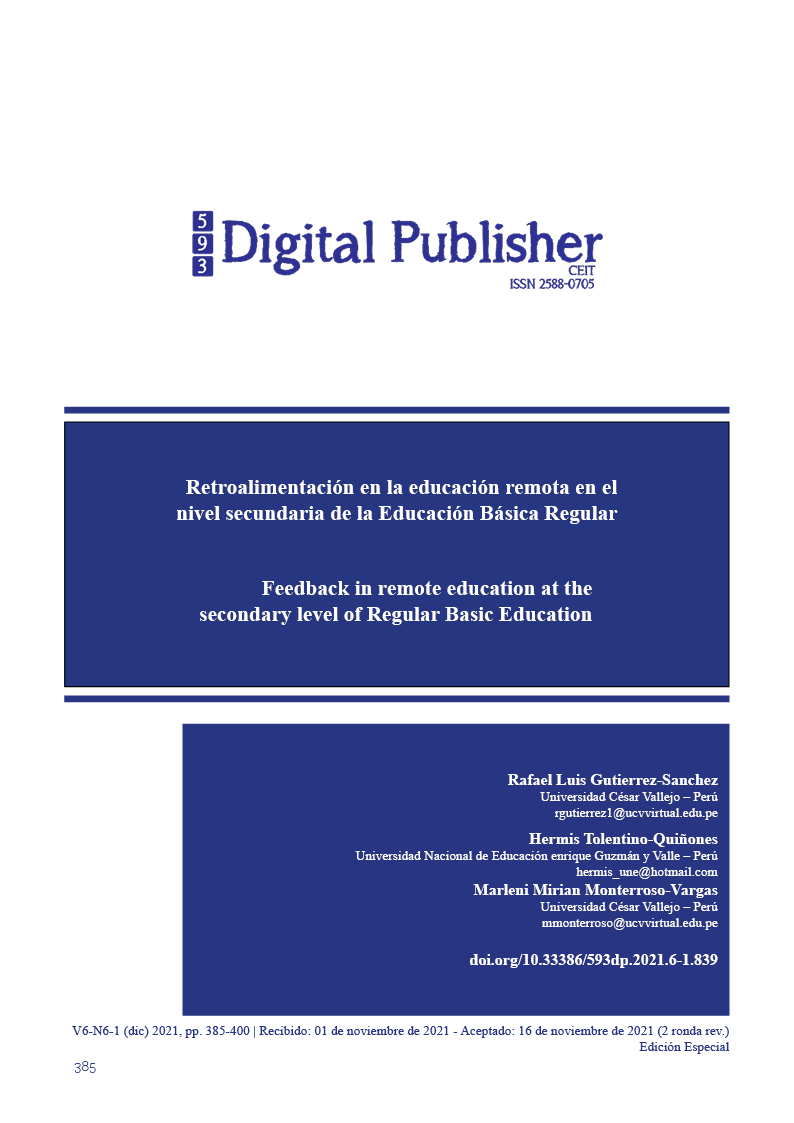Feedback in remote education at the secondary level of Regular Basic Education
Main Article Content
Abstract
The interruption of face-to-face classes and the various educational institutions led to the implementation of remote education that brought with it many changes, including the way of evaluating and providing feedback to students, for this reason the present research had as a general objective analyze how it is carried out evidence feedback of students of three schools of the secondary level of Regular Basic Education located in the department of Lima, Peru. For this purpose, this research was based on the interpretive hermeneutic paradigm, under the qualitative approach of a basic type; the instrument used was semi-structured surveys which were applied to teachers and students from three different schools. From these, it was found that teachers perform descriptive and reflective feedback constantly; and for this, they make use of the application WhatsApp because it allows you to send messages in various formats: audio, video and written. In addition, it was identified that it is the teachers who carry out the feedback and sometimes the parents help the students send their evidence.
Downloads
Article Details

This work is licensed under a Creative Commons Attribution-NonCommercial-ShareAlike 4.0 International License.
1. Derechos de autor
Las obras que se publican en 593 Digital Publisher CEIT están sujetas a los siguientes términos:
1.1. 593 Digital Publisher CEIT, conserva los derechos patrimoniales (copyright) de las obras publicadas, favorece y permite la reutilización de las mismas bajo la licencia Licencia Creative Commons 4.0 de Reconocimiento-NoComercial-CompartirIgual 4.0, por lo cual se pueden copiar, usar, difundir, transmitir y exponer públicamente, siempre que:
1.1.a. Se cite la autoría y fuente original de su publicación (revista, editorial, URL).
1.1.b. No se usen para fines comerciales u onerosos.
1.1.c. Se mencione la existencia y especificaciones de esta licencia de uso.
References
Andrade, R. y Páez, M. (2021). El podcast como herramienta de retroalimentación en la evaluación de actividades virtuales. MENDIVE, Revista de educación, 19(1), 16–29. http://mendive.upr.edu.cu/index.php/MendiveUPR/article/view/2107
Anijovich, R. (2019). Orientaciones para la Formación Docente y el Trabajo en el aula: Retroalimentación Formativa Publicación. Summa.
Bautista, T., Santa María, H., Córdova, U. (2021). Logro de competencias en el proceso de aprendizaje durante tiempos del COVID-19. Propositos y Representaciones, 9(1), e1175. http://dx.doi.org/10.20511/pyr2021.v9n1.1175
Bein, K. (2007). Lo que hacen los mejores profesores universitarios. In InterCambios: Dilemas y Transiciones de la Educación Superior , 1(1) pp. 82–87. https://ojs.intercambios.cse.udelar.edu.uy/index.php/ic/article/view/15
Beltrán, J., Venegas, M., Villar-Aguilés, A., Andrés-Cabello, S., Jareño-Ruiz, D. y De Gracia-Soriano, P. (2020). Educar en época de confinamiento: la tarea de renovar un mundo común. Revista de Sociología de La Educación-RASE, 13(2), 92-104. https://doi.org/10.7203/rase.13.2.17187
Bizarro, W., Sucari, W., y Quispe -Coaquira, A. (2019). Estudio del poema Liqiliqi en Suma arusa. Revista Innova Educación, 1(1), 140–146. https://doi.org/10.35622/j.rie.2019.01.012
Bonal, X. y González, S. (2021). Educación formal e informal en confinamiento: una creciente desigualdad de oportunidades de aprendizaje. Revista de Sociología de La Educación-RASE, 14(1), 44-62. https://doi.org/10.7203/rase.14.1.18177
Calisto-Miranda, S., y Ortiz-Navarrete, M. (2019). Chilean graders’ behaviors and perceptions of a foreign language reschooling program towards verbal feedback on pronunciation. Revista Electronica Educare, 23(3), 1–18. https://doi.org/10.15359/ree.23-3.5
Cárcamo, B. (2020). Classifying written corrective feedback for research and educational purposes: A typology proposal. Profile: Issues in Teachers’ Professional Development, 22(2), 211–222. https://doi.org/10.15446/profile.v22n2.79924
Carless, D. (2019). Feedback loops and the longer-term: towards feedback spirals. Assessment and Evaluation in Higher Education, 44(5), 705–714. https://doi.org/10.1080/02602938.2018.1531108
Castro, C. y Moraga, A. (2020). Evaluación en ambientes virtuales de aprendizaje. IACC Expertos en Educación Online.
CEPAL-UNESCO. (2020). La educación en tiempos de pandemia de COVID-19. Informe COVID-19 CEPAL-UNESCO, 1(85), 51–59. https://doi.org/10.19052/ruls.vol1.iss85.4
Contreras, G. (2018). Peer teacher feedback at the university. An alternative of formative assessment. Formacion Universitaria, 11(4), 83–94. https://doi.org/10.4067/S0718-50062018000400083
Contreras-Pérez, G. y Zúñiga-González, C. (2018). Concepciones sobre retroalimentación del aprendizaje: Evidencias desde la Evaluación Docente en Chile. Actualidades Investigativas En Educación, 18(3), 1-25. https://doi.org/10.15517/aie.v18i3.34327
Covarrubias-Hernández, L. (2021). Educación a distancia: transformación de los aprendizajes. Telos Revista de Estudios Interdisciplinarios En Ciencias Sociales, 23(1), 150–160. https://doi.org/10.36390/telos231.12
Crosthwaite, P., Storch, N. y Schweinberger, M. (2020). Less is more? The impact of written corrective feedback on corpus-assisted L2 error resolution. Journal of Second Language Writing, 49, 100729. https://doi.org/10.1016/j.jslw.2020.100729
Del Cid, A., Méndez, R. y Sandoval, F. (2011). Investigación Fundamentos y Metodología. In Prentice Hall.
Díez, E. y Gajardo, K. (2020). Educating and evaluating in times of coronavirus: The situation in Spain. Multidisciplinary Journal of Educational Research, 10(2), 102–134. https://doi.org/10.447/remie.2020.5604
DRELP. (2020). Plan regional de implmentación del CNEB en el marco de la mejora de los aprendizajes 2020. 103. http://direpro.regionpiura.gob.pe/documentos/resoluciones/res202_2014.pdf
Escudero, C. y Cortez, L. (2018). Técnicas y métodos cualitativos para la investigación científica. In Editorial UTMACH.
Ferrada-Bustamante, V., Gonzáles-Oro, N., Ibarra-Caroca, M., Ried-Donaire, A., Vergara-Correa, D. y Castillo-Retamal, F. (2021). Formación docente en TIC y su evidencia en tiempos de COVID-19. Revista Saberes Educativos, (6), 144-168. https://doi.org/10.5354/2452-5014.2021.60715
Garcia, L. (2017). Educación a distancia y virtual: calidad, disrupción, aprendizajes adaptativo y móvil. RIED. Revista Iberoamericana de Educación a Distancia, 20(2), 9-25. https://doi.org/10.5944/ried.20.2.18737
Garcia, L. (2021). COVID-19 y educación a distancia digital: preconfinamiento, confinamiento y posconfinamiento. RIED. Revista Iberoamericana de Educación a Distancia, 24(1), 09-32. https://doi.org/10.5944/ried.24.1.28080
García, M., Navarro-Sempere, A. y Segovia, Y. (2021). Opinión del Alumnado sobre el Uso de WhatsApp en el Aprendizaje de la Histología Durante COVID-19. International Journal of Morphology, 39(3), 692–697. https://doi.org/10.4067/s0717-95022021000300692
Gómez-Vahos, L., Muriel-Muñoz, L. y Londoño-Vásquez, D. (2019). El papel del docente para el logro de un aprendizaje significativo apoyado en las TIC. Encuentros, 17(02), 118–131. https://www.redalyc.org/articulo.oa?id=476661510011
Gómez A, I. y Escobar-Mamani, F. (2021). Educación virtual en tiempos de pandemia: Incremento de la desigualdad social en el Perú. Chakiñan, Revista De Ciencias Sociales y Humanidades, I, 1–13. https://preprints.scielo.org/index.php/scielo/preprint/view/1996#.YFvtuoYYVe0.mendeley
Gonzales, N., Salcines, I. y García, E. (2015). Tendencias emergentes en evaluación formativa y compartida. El papel de las nuevas tecnologías. Editorial Universidad Cantabria. https://doi.org/10.22429/euc2015.017
Guadalupe, C. y Rivera, A. (2021). Evaluación formativa del aprendizaje en contextos de provisión remota de servicios educativos en América Latina y el Caribe Revisión documental , guías y herramientas. Unicef.
Hattie, J. y Timperley, H. (2007). The power of feedback. Review of Educational Research, 77(1), 81–112. https://doi.org/10.3102/003465430298487
Hill, J. y West, H. (2020). Improving the student learning experience through dialogic feed-forward assessment. Assessment and Evaluation in Higher Education, 45(1), 82–97. https://doi.org/10.1080/02602938.2019.1608908
Hounsell, D., McCune, V., Hounsell, J. y Litjens, J. (2008). The quality of guidance and feedback to students. Higher Education Research and Development, 27(1), 55–67. https://doi.org/10.1080/07294360701658765
Inga-Lindo, D. y Aguirre-Chávez, F. (2021). El enfoque de la educación virtual desde una perspectiva holístico frente a la pandemia del COVID – 19. Revista Cátedra, 4(1), 81–97. http://www.dspace.uce.edu.ec/handle/25000/22593
Jiang, S. y Yan, X. (2019). Research on the Effect of Supervisor Feedback for Undergraduate Thesis Writing. English Language Teaching, 13(1), 43-50. https://doi.org/10.5539/elt.v13n1p43
Joya-Rodríguez, M. (2020). La evaluación formativa, una práctica eficaz en el desempeño docente. Revista Scientific, 5(16), 179–193. https://doi.org/10.29394/scientific.issn.2542-2987.2020.5.16.9.179-193
Kluger, A. y DeNisi, A. (1996). Effects of feedback intervention on performance: A historical review, a meta-analysis, and a preliminary feedback intervention theory. Psychological Bulletin, 119(2), 254–284. https://doi.org/10.1037//0033-2909.119.2.254
Ley 29733 de 2011. (2011). Ley de protección de datos personales. En El Peruano (pp. 445746–445753). http://www.leyes.congreso.gob.pe/Documentos/Leyes/29733.pdf
Ley General de Educación. (2003). Ley N° 28044 - Ley General de Educación. El Peruano, 1–36. http://www.minedu.gob.pe/p/ley_general_de_educacion_28044.pdf
Minedu. (2018). Manual Rubricas Desempeño Docente. 40. http://evaluaciondocente.perueduca.pe/rubricas-de-observacion-de-aula/pdf/manual-de-aplicacion-jardin.pdf
Minedu. (2020). Orientaciones pedagógicas para brindar la retroalimnteación a los estudiantes en un contexto de educación no presencial en el nivel de educación secundaria. 45. https://www.ugel01.gob.pe/wp-content/uploads/2020/04/Orientaciones-Pedagogicas-para-Brindar-la-Retroalimentacion-a-los-Estudiantes-23-06-20.pdf
Ministerio de educación Chile. (2020). Orientación al sistema escolar en contexto de COVID-19. 44. DEG.
Ministerio de Educación del Perú. (2020). Resolución viceministerial N° 00094-2020-MINEDU. Norma que regula la Evaluación de las Competencias de los Estudiantes de la Educación Básica. MInisterio de Educaciòn, 75.
Mollo-Flores, M. y Medina-Zuta, P. (2020). Evaluación formativa propuesta pedagógica integral en tiempos de pandemia. Maestro y Sociedad. Revista Electrónica Para Maestros y Profesores, 17(4), 635–651. https://maestroysociedad.uo.edu.cu/index.php/MyS/article/view/5235/4751
Morales, S. (2021). Argentina 2020: vicisitudes y dilemas de la educación pública en contextos de pandemia. Revista Linhas, 22(48), 10–40. https://doi.org/10.5965/1984723822482021010
Muñoz, J. y Lluch, L. (2020). Educación y Covid-19: Colaboración de las Familias y Tareas Escolares. Revista Internacional De Educación para La Justicia Social, 9(3e). https://revistas.uam.es/riejs/article/view/12182
Muñoz, M. (2019). Comparación de los niveles estructurales en la redacción académica del texto universitario. Revista Eduser, 6(1), 22-34. https://doi.org/10.18050/reveduser.v6n1a3
Olvera-Espinoza, E., Pedroni-Lara, F. y Pérez-Madrid, J. (2017). Modelo Organizacional de Retroalimentación para el Aprendizaje del Capital Humano : MORACH. Revista de Sistemas y Gestión Educativa, 4(11), 1–13. https://www.ecorfan.org/bolivia/researchjournals/Sistemas_y_Gestion_Educativa/vol4num11/Revista_de_Sistemas_y_Gestion_Educativa_V4_N11_1.pdf
Orrego, R., Singer, N., Úbeda, R. y Yáñez, S. (2019). Criterios y frecuencia de uso de estrategias de retroalimentación correctiva: Un estudio de caso sobre las percepciones de estudiantes y profesores universitarios. RLA. Revista de Lingüística Teórica y Aplicada, 57(1), 51–78. https://doi.org/10.4067/s0718-48832019000100051
Ortega, M. (2021). Las posibilidades didácticas del WhatsApp en la formación docente no universitaria. Revista Estudios Psicológicos, 1(1), 20–32. https://doi.org/10.35622/j.rep.2021.01.002
Packer, M. (2013). La ciencia de la investigación cualitativa: Introducción e índice. La Ciencia de La Investigación Cualitativa. Uniandes.
Picón, G., Rodriguez, N. y Oliveira, A. (2021). Prácticas de evaluación en entornos virtuales de aprendizaje durante la pandemia COVID-19 y el regreso a la presencialidad. Scientific Electronic Library Online, 26(1), 1-14. https://preprints.scielo.org/index.php/scielo/preprint/view/2690/version/2842
Ravela, P., Picaroni, B. y Loureiro, G. (2017). ¿Cómo mejorar la evaluación en el aula? Grupo Magro Editores.
Rodríguez, A. y Pérez, A. (2017). Métodos científicos de indagación y de construcción del conocimiento. Revista EAN, 82, 179–200. https://doi.org/10.21158/01208160.n82.2017.1647
Sanchez, L. y Manrique, M. (2018). La retroalimentación más allá de la evaluación. Revista Latinoamericana de Educación Comparada, 9(14) 89–104. https://www.saece.com.ar/relec/revistas/14/est1.pdf
Shute, V. (2007). Focus on Formative Feedback. Educational Testing Service, 78(1), 153–189. https://www.ets.org/Media/Research/pdf/RR-07-11.pdf
Stobart, G. (2010). Tiempos de pruebas: los usos y abusos de la evaluación. In Morata.
Tejedor, S., Cervi, L., Tusa, F. y Parola, A. (2020). Educación en tiempos de pandemia: reflexiones de alumnos y profesores sobre la enseñanza virtual universitaria en España, Italia y Ecuador. Revista Latina, 78, 1–21. https://doi.org/10.4185/rlcs-2020-1466
Torres, Z. (2019). Efectos de variaciones en la retroalimentación pedagógica en el aprendizaje de inglés. Cuadernos de Lingüística Hispánica, 34, 215–232. https://doi.org/10.19053/0121053x.n34.2019.9722.
Tunstall, P. y Gipps, C. (1996). Teacher Feedback to Young Children in Formative Assessment: a typology. British Educational Research Journal, 22(4), 45-124. https://doi.org/10.1080/0141192960220402
Wayne, R. y Noe, R. (2005). Administración de recursos humanos. Pearson.
Wilson, P. (2002). La Retroalimentación a través de la Pirámide y la escalera de retroalimentación. En Seminario cerrando brechas: Encuentro de tutores latinoamericanos en línea. Miami.
Zainuddin, Z., Perera, C. J., Haruna, H. y Habiburrahim, H. (2020). Literacy in the new norm: stay-home game plan for parents. Information and Learning Science, 121(7–8), 645–653. https://doi.org/10.1108/ILS-04-2020-0069




